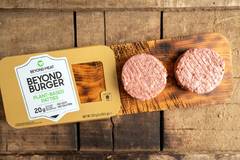
- Industry news
Industry news
- Category news
Category news
- Reports
- Key trends
- Multimedia
- Journal
- Events
- Suppliers
- Home
- Industry news
Industry news
- Category news
Category news
- Reports
- Key trends
- Multimedia
- Events
- Suppliers
EU lawmakers vote to ban “meaty” names for plant-based food
Key takeaways
- EU Parliament votes to restrict the use of traditional meat terms like “burger,” and “sausage” for plant-based foods.
- Critics argue the move misaligns with consumer understanding and existing legal protections.
- Final decision pending trilogue talks between the European Parliament, Commission, and Council, with growing pressure from plant-based coalitions to overturn the proposed restrictions.

The European Parliament has voted to restrict the use of words like “sausage,” “steak,” and “burger” on the labels of plant-based food, the latest move in the “meaty” names debate.
Earlier this week, MEPs adopted the proposal, which was put forward by a French member of the EPP group, Celine Imart, with 355 votes for, 247 against, and 30 abstentions.
The vote closely follows WePlanet and the European Vegetarian Union (EVU) setting up the “No Confusion Coalition” last week, which represents more than 400 organizations, NGO, and food companies across Europe.
Word censorship
Europe is the biggest consumer market globally for plant-based meat alternatives, a market from which EU farmers benefit as it creates higher-value markets for pulses, soy, wheat, fungi, nuts, and vegetables — many of which are already grown in Europe.
The vote is hailed as a victory for livestock farmers who say the misuse of words and phrases on the label of plant-based food threatens their industry.
However, plant-based advocates disagree and are disappointed that Europe is edging closer to a ban.
“Banning words like ‘burger,’ or ‘sausage’ for plant-based products is unnecessary and counterproductive,” says Rafael Pinto, senior policy manager at the EVU. “It undermines consumer freedom and sustainability while pretending to solve a problem that doesn’t exist. It further goes against the European agenda for innovation and simplification, adding bureaucracy and complexity where it’s not needed.”
Pinto adds that Europeans understand and appreciate terms like “vegan sausage” and “plant-based burger” because they clearly describe how to prepare and enjoy sustainable alternatives.
Consumers are not confused
In 2024, the European Court of Justice also ruled on the subject, stating that current laws were sufficient to protect consumers.
Jasmijn de Boo, global CEO of ProVeg International, tells Food Ingredients First that the vote’s outcome is very disappointing, not least because surveys have shown that accidental purchases of plant-based alternatives are rare and that understanding around plant-based terms is high. She also highlights that the EU already has robust legislation in place to protect consumers from misleading labels.
“The current EU legal framework already provides adequate protection against misleading labeling, and this has been reinforced by the European Court of Justice, which confirmed that existing rules are sufficient to prevent and penalize misleading practices.”
“Beyond this, Europe has the biggest market globally for plant-based alternatives, and the future is one of growth. The global alternative protein market is forecast to grow from US$108 billion in 2025 to nearly US$590 billion by 2035.”
“Restricting the labeling of products will weaken the position of European producers in this market. Plant-based alternatives also present huge opportunities, not just for companies, but for the EU’s farmers as well. These alternatives create higher-value markets for pulses, soy, wheat, fungi, nuts, and vegetables, many of which are already grown in Europe,” adds De Boo.
Plant-based advocates’ disappointment
Rob De Schutter, from WePlanet, adds that the vote shows a worrying disconnect between policymakers and citizens. “There is no confusion among consumers — only confusion in Brussels. Parliament should be fixing real problems in our food system, not inventing new ones. Exactly whose interest is the EU protecting here? It’s certainly not that of consumers.”
Plant-based proponents say Parliament’s approved restrictions proposal this week would make it harder for consumers to choose sustainable options, impose costly rebrandings on companies, and discourage innovation in a sector crucial to Europe’s climate and health goals.
Another concern is that Europe risks falling behind other markets that are embracing innovation and consumer choice.
The coalition will continue its efforts in the upcoming trilogue negotiations and calls on the Council and Commission not to agree to these unnecessary restrictions or a ban. It will now be up to the governments of the member states and the European Commission to negotiate the final text within the co-decision process and decide whether the Parliament’s position will become law.
The negotiations will start in the next few weeks and finish by the end of the year.
“We’re not giving up,” adds De Schutter. Europe’s citizens and farmers want a food system that’s fair, sustainable, and future-proof. We’ll keep working with partners across the EU to make sure common sense prevails and that sustainable plant-based meat alternatives are helped rather than harmed in Europe.”











